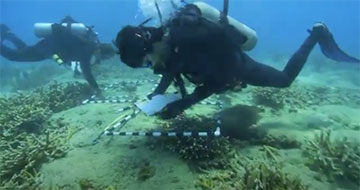Dive Deep into Your Research Interests
You’re ready to take your interest in marine environments to the next level. Nova Southeastern University’s Ph.D. in Marine Biology/Oceanography prepares you for further research on a selected topic of importance in the ocean sciences. You can focus on marine biology or physical oceanography, aligning your interests to your personal and career goals.
NSU is also home to several institutes including the Broward County Sea Turtle Conservation Program, NSU's Guy Harvey Research Institute, Marine Environmental Education Center, the National Coral Reef Institute, and the Save Our Seas Foundation Shark Research Center. As a graduate student, you’ll have access to expert faculty and leading researchers studying everything from shark movement patterns to coral reef conservation. Upon completion of this program, you’ll be prepared for careers in academia, industry, and government.
Quick Facts
Shark Sightings
Every student has a story. The “Shark Sightings” video series highlights undergraduates, graduate students, and NSU alumni who are diving into their coursework, getting involved in extracurriculars, and using their education to make a difference in their chosen fields.
Learn why each Shark says they chose NSU, and how their degree is preparing them to dominate.
Career Outcomes
Admissions Requirements
For Ph.D. applicants, previous degree(s) should be in the area of mathematics (for Physical Oceanography) or an appropriate area of the natural sciences (for Marine Biology) A Master's degree is required in order to apply, and is preferred to be in Biological Oceanography, Biology, Marine Biology, or another related science. Acceptance into the program is effectively provisional for all. The accepted student is a "pre-candidate" until later defense of a research proposal and successful passing of comprehensive exams.
- Submit Online Application + $50 application fee
- Submit GRE scores (taken within the past 5 years). You may request this from ETS GRE
- Submit official transcripts from all attended institutions, undergraduate and graduate
- Letter of Endorsement from an NSU faculty member
- To qualify for acceptance, applicants must submit a transcript for a master's degree with a cumulative GPA of at least 3.50; and a bachelor's degree with a major GPA of at least 3.00 and a cumulative GPA of 2.90.
- Submit a 'Resume' OR 'Curriculum Vita'
Note: The NSU Faculty Letter of endorsement is the most important item for the application. The letter will detail the lab you are joining, your proposed research, any applicable pay, how your research will be funded, etc. Without that letter, NSU cannot review your application.
Learning Outcomes
A successful recipient of the Ph.D. in Oceanography/Marine Biology is expected to:
- Understand basic marine biological, chemical, geological, and physical processes to a level sufficient to communicate and collaborate with experts in those sub-disciplines; and to be able to apply this knowledge to issues in research and resource management
- Apply the scientific method to define, investigate, and evaluate hypotheses in at least one of these sub-disciplines
- Conduct (as guided by, and to the satisfaction of, the doctoral committee and NSU's Halmos College faculty) advanced, original, and independent research that adds to the body of oceanographic knowledge in one or more of the sub-discipline areas
- Communicate scientific results and conclusions clearly and logically in a written dissertation and in scientific presentations and publications
Graduate Open House
Join us on Wednesday, October 15 at 12:00 p.m. EST to learn more about our marine/environmental sciences, including careers within the field, NSU graduate degree offerings, and the application process.
This event is free and open for all to attend. You may register for the Open House HERE.
Program directors and department faculty from the Department of Marine and Environmental Sciences and NSU Halmos College of Arts and Sciences Graduate Admissions will be in attendance to answer your questions about your program(s) of interest.
The Department of Marine & Environmental Sciences will accept a total of 30 credits from previous graduate coursework. Coursework must replicate NSU offerings in the major field of interest or must be closely related. Transfer credits must be graduate-level from accredited institutions. Students are required to consult with a Program Coordinator regarding the transfer of credit policy.
Students are expected to complete the Ph.D. in Oceanography/Marine Biology within 5 years of full-time study, and within 9 years in the case of part-time students. A minimum of 3 years enrollment in the Ph.D. program is required.
Program Director and Admissions Staff
You and NSU – the Sky’s the Limit
Your support and involvement helps us create, investigate, and improve the world around us. Join us in our passion to bring out the best in our students, our society, our environment, and our economy.





